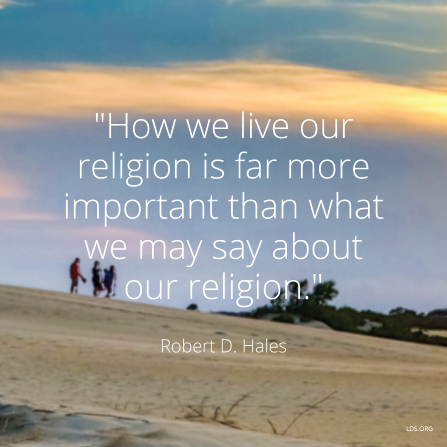3
Nephi 3:2

Live Our Religion
“How we live our
religion is far more important than what we may say about our
religion.”—Elder Robert D. Hales, “Preserving
Agency, Protecting Religious Freedom”
What
2 Lachoneus,
most noble and chief governor of the land, behold, I write this
epistle unto you, and do give unto you exceedingly great praise
because of your firmness, and also the firmness of your people,
in amaintaining that
which ye suppose to be your right and bliberty;
yea, ye do stand well, as if ye were supported by the hand of a god,
in the defence of your liberty, and your property, and your country,
or that which ye do call so.
Beginning of epistle
to Lachoneus, the governor of the land from Gidgiddoni, the leader of
the Gadianton robbers.
Why
He is trying to
flatter Lachoneus before he tells him he is going to destroy him and
his people. To get Lachoneus to surrender without a battle.
Pattern
3 Ne.
2:12--- In
a few verses -this happens
12
Therefore, all the Lamanites who had become converted unto the Lord
did unite with their brethren, the Nephites, and were compelled, for
the safety of
their lives and their women and their children, to take up arms
against those Gadianton robbers, yea, and also to maintain their
rights, and the privileges of their church and of their worship, and
their freedom and their liberty.
TG Liberty
See
also Agency ; Bondage,
Physical ; Bondage,
Spiritual ; Citizenship ;Deliver ; Freedom ; Governments ;Opposition
Mosiah
23:13
13
And now as ye have been delivered by the power of God out of these
bonds; yea, even out of the hands of
king Noah and his people, and also from the bonds of
iniquity, even so I desire that ye should stand
fast in
this liberty wherewith
ye have been made free, and that ye trust no
man to
be a king over you.
Christ
Gal.
5:1
1 Stand fast
therefore in the liberty wherewith
Christ hath made us free,
and be not entangled again
with the yoke of bondage.
Conference
By
Elder Robert D. Hales Of
the Quorum of the Twelve Apostles
This
is Easter Sunday: a day of gratitude and remembrance honoring our
Savior Jesus Christ’s Atonement and Resurrection for all mankind.
We worship Him, grateful for our freedom of religion, freedom of
assembly, freedom of speech, and our God-given right of agency.
As
prophets foretold about these latter days in which we live, there are
many confused about who we are and what we believe. Some are “false
accusers … [and] despisers of those that are good.”1 Others
“call evil good, and good evil; [and] put darkness for light, and
light for darkness.”2
As
those around us make choices about how to respond to our beliefs, we
must not forget that moral agency is an essential part of God’s
plan for all His children. That eternal plan, presented to us in the
premortal Council in Heaven, included the gift of agency.3
In
that Grand Council, Lucifer, known as Satan, used his agency to
oppose God’s plan. God said: “Because … Satan rebelled
against me, and sought to destroy the agency of man, which I, the
Lord God, had given him, … I caused that he should be cast
down.”4
He
continued: “And also a third part of the hosts of heaven turned he
away from me because of their agency.”5
As
a result, Heavenly Father’s spirit children who chose to reject His
plan and follow Lucifer lost their divine destiny.
Jesus,
who exercised His agency to sustain Heavenly Father’s plan, was
identified and appointed by the Father as our Savior, foreordained to
perform the atoning sacrifice for all. Similarly, our exercise of
agency to keep the commandments enables us to fully understand who we
are and receive all of the blessings our Heavenly Father
has—including the opportunity to have a body, to progress, to
experience joy, to have a family, and to inherit eternal life.
To
keep the commandments, we need to know the official doctrine of the
Church so we are not diverted from Christ’s leadership by the
ever-changing whims of individuals.
The
blessings we enjoy now are because we made the choice to follow the
Savior before this life. To everyone hearing or reading these words,
whoever you are and whatever your past may be, remember this: it is
not too late to make that same choice again and follow Him.
...As
we walk the path of spiritual liberty in these last days, we must
understand that the faithful use of our agency depends upon our
having religious freedom. We already know that Satan does not want
this freedom to be ours. He attempted to destroy moral agency in
heaven, and now on earth he is fiercely undermining, opposing, and
spreading confusion about religious freedom—what it is and why it
is essential to our spiritual life and our very salvation.
There
are four cornerstones of religious freedom that we as Latter-day
Saints must rely upon and protect.
The
first is freedom to believe. No one should be criticized, persecuted,
or attacked by individuals, or governments either, for what he or she
believes about God. It is very personal and very important. An early
declaration of our beliefs regarding religious liberty states:
“No
government can exist in peace, except such laws are framed and held
inviolate as will secure to each individual the free exercise of
conscience. …
The
second cornerstone of religious liberty is the freedom to share our
faith and our beliefs with others. The Lord commands us, “Ye shall
teach [the gospel to] your children … when thou sittest in thine
house.”11 He
also said to His disciples, “Go ye into all the world, and preach
the gospel to every creature.”12 As
parents, full-time missionaries, and member missionaries, we rely on
religious freedom in order to teach the Lord’s doctrine in our
families and throughout the world.
The
third cornerstone of religious liberty is the freedom to form a
religious organization, a church, to worship peacefully with others.
The eleventh
article of faith declares,
“We claim the privilege of worshiping Almighty God according to the
dictates of our own conscience, and allow all men the same privilege,
let them worship how, where, or what they may.” International human
rights documents and many national constitutions support this
principle.
The
fourth cornerstone of religious liberty is the freedom to live our
faith—free exercise of faith not just in the home and chapel but
also in public places. The Lord commands us not only to pray
privately13 but also
to go forth and “let [our] light so shine before men, that they may
see [our] good works, and glorify [our] Father which is in heaven.”14
As
we face increased pressure to bow to secular standards, forfeit our
religious liberties, and compromise our agency, consider what the
Book of Mormon teaches about our responsibilities. In the book of
Alma we read of Amlici, “a very cunning” and “wicked man” who
sought to be king over the people and “deprive them of their rights
and privileges,” which “was alarming to the people of the
church.”15 They
were taught by King Mosiah to raise their voices for what they felt
was right.16 Therefore
they “assembled themselves together throughout all the land, every
man according to his mind, whether
it were for or against Amlici, in separate bodies, having much
dispute … one with another.”17
In
these discussions, members of the Church and others had the
opportunity to come together, experience the spirit of unity, and be
influenced by the Holy Ghost. “And it came to pass that the voice
of the people came against Amlici, that he was not made king.”18
As
disciples of Jesus Christ we have a responsibility to work together
with like-minded believers, to raise our voices for what is right.
While members should never claim or even imply that they are speaking
for the Church, we are all invited, in our capacity as citizens, to
share our personal witness with conviction and love—“every man
[and woman] according to his [or her own] mind.”19
“I
am bold to declare before Heaven that I am just as ready to die in
defending the rights of a Presbyterian, a Baptist, or a good man of
any other denomination [as for a Mormon]; for the same principle
which would trample upon the rights of the Latter-day Saints would
trample upon the rights of the Roman Catholics, or of any other
denomination who may be unpopular and too weak to defend themselves.
“It
is a love of liberty which inspires my soul—civil and religious
liberty to the whole of the human race.”20
Brothers
and sisters, we are responsible to safeguard these sacred freedoms
and rights for ourselves and our posterity. What can you and I do?
First,
we can become informed. Be aware of issues in your community that
could have an impact on religious liberty.
Second,
in your individual capacity, join with others who share our
commitment to religious freedom. Work side by side to protect
religious freedom.
Third,
live your life to be a good example of what you believe—in word and
deed. How we live our religion is far more important than what we may
say about our religion.
Our
Savior’s Second Coming is drawing nearer. Let us not delay in this
great cause. Remember Captain Moroni, who hoisted the title of
liberty inscribed with the words “In memory of our God, our
religion, and freedom, and our peace, our wives, and our
children.”21 Let
us remember the people’s response: exercising their agency, they
“came running together” with a covenant to act.22
My
beloved brothers and sisters, don’t walk! Run! Run to receive the
blessings of agency by following the Holy Ghost and exercising the
freedoms God has given us to do His will...
Apply
to
sum up what elder Hales said:
1-Become
informed
2-Work
with others to protect religious freedom
3-Be
a good example of what you believe
I
would add one more thing. Be grateful for the freedom you have. Be
grateful for the gift of the plan of salvation and the atonement.
That Christ has made us free through the gift of agency.
Hymns
Children
224
-My Country
